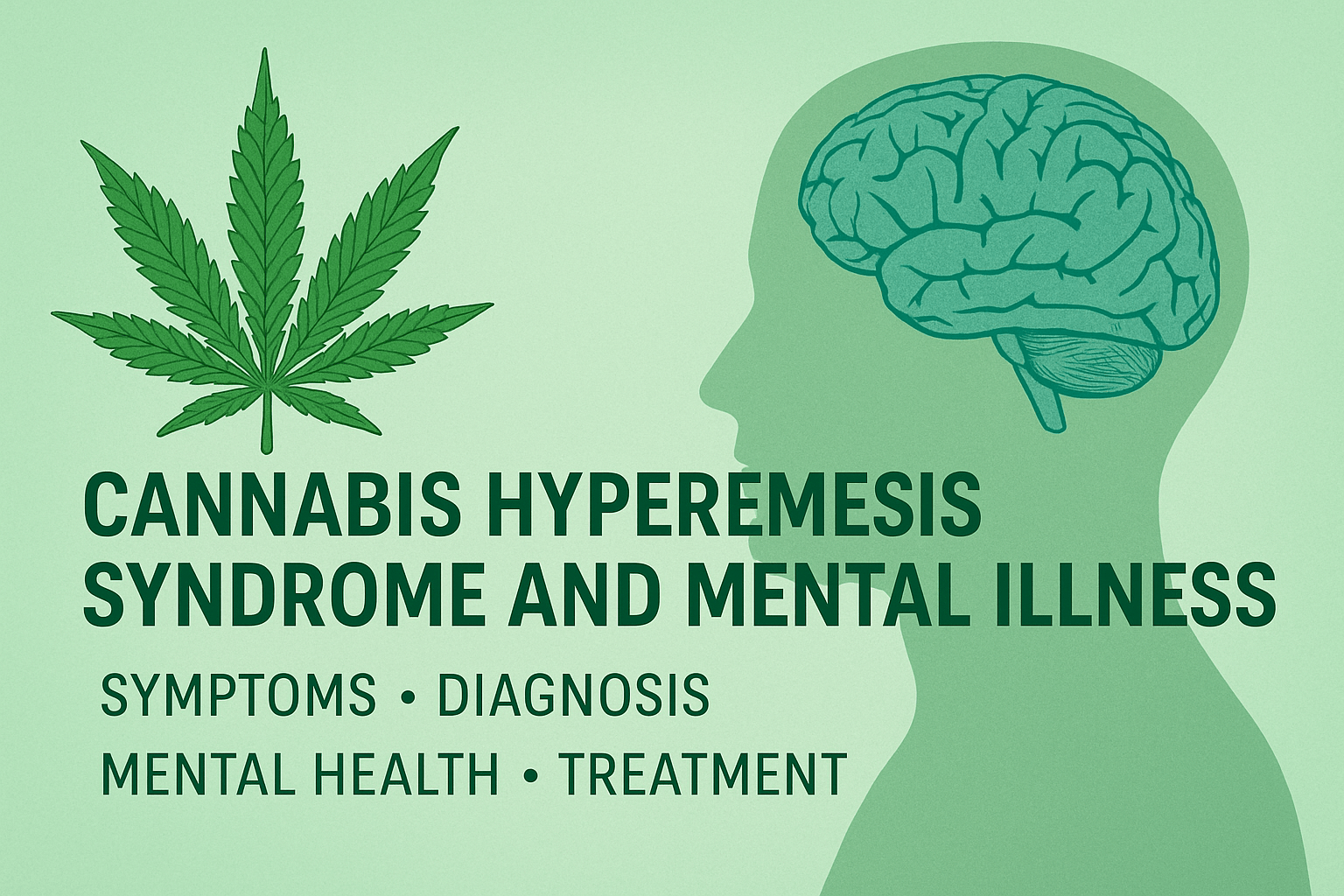- Home
- CHS Research
- Cannabis Hyperemesis Syndrome and Mental Illness

Cannabis Hyperemesis Syndrome and Mental Illness: Unraveling the Complex Intersection
Introduction
As cannabis use becomes more widespread—both recreationally and medicinally—new and unexpected side effects have entered the medical spotlight. One such phenomenon is Cannabis Hyperemesis Syndrome (CHS), a condition characterized by cyclical vomiting, nausea, and compulsive hot bathing in chronic cannabis users. While it remains relatively rare and underdiagnosed, CHS is gaining attention due to its paradoxical nature: cannabis is often used to alleviate nausea, yet in CHS, it appears to be the cause.
Beyond the physical symptoms, there is growing concern about how CHS intersects with mental illness, particularly anxiety, depression, psychosis, and substance use disorders. This article delves into the multifaceted relationship between CHS and mental health, exploring causality, co-morbidity, and the implications for diagnosis and treatment.
What is Cannabis Hyperemesis Syndrome?
CHS is a relatively recent diagnostic entity, first formally described in 2004. It typically presents in chronic, long-term cannabis users, and its hallmark symptoms include:
- Recurrent, severe nausea and vomiting
- Abdominal pain
- Temporary relief from symptoms with hot showers or baths
- Resolution of symptoms upon cessation of cannabis use
The syndrome is divided into three phases:
- Prodromal Phase – Mild nausea, anxiety, and early morning vomiting
- Hyperemetic Phase – Intense, intractable vomiting and compulsive hot bathing
- Recovery Phase – Symptom cessation following cannabis abstinence
While the precise mechanism remains unclear, theories suggest involvement of the endocannabinoid system, gastrointestinal tract dysfunction, and central nervous system dysregulation.
Cannabis Use and Mental Health: A Double-Edged Sword
Cannabis affects the endocannabinoid system, which plays a central role in mood regulation, appetite, and stress response. For individuals with mental illness, particularly anxiety and depression, cannabis often serves as a self-medication tool. However, chronic or heavy use may exacerbate underlying psychiatric conditions or induce new symptoms, including:
- Increased anxiety and panic attacks
- Depressive symptoms
- Cognitive impairment
- Psychotic episodes, particularly in high-THC strains
This duality complicates the landscape: cannabis may provide short-term relief for mental health symptoms, yet its long-term effects can be detrimental—especially in vulnerable populations.
The Link Between CHS and Mental Illness
1. Anxiety and CHS
Patients with CHS frequently report pre-existing anxiety disorders. Anxiety may heighten sensitivity to bodily sensations, making nausea and abdominal discomfort more distressing. Additionally, the compulsive behavior of taking hot showers—often described as a coping mechanism—can mirror anxiety-related rituals or compulsions seen in disorders like OCD.
There is also a feedback loop to consider: the unpredictability and severity of CHS episodes can worsen anxiety, especially if patients lack a definitive diagnosis or encounter disbelief from medical professionals.
2. Depression and CHS
The cycle of vomiting, food aversion, and social withdrawal can contribute to depressive symptoms. CHS patients often report:
- Feelings of hopelessness
- Shame or guilt over cannabis use
- Social isolation due to symptom unpredictability
Moreover, some may continue cannabis use despite awareness of its role in causing symptoms, a pattern resembling depressive anhedonia and self-sabotaging behaviors.
3. Psychosis and CHS
There is compelling evidence linking high-THC cannabis with an increased risk of psychosis, particularly in genetically predisposed individuals. While CHS is not inherently psychotic, patients experiencing extreme vomiting, dehydration, and sleep deprivation may develop transient psychotic features.
4. Substance Use Disorders
CHS may coexist with broader patterns of cannabis use disorder (CUD). Many CHS sufferers experience difficulty quitting, even when aware of the consequences. This can be attributed to:
- Psychological dependence
- Using cannabis to manage co-occurring anxiety or insomnia
- Withdrawal symptoms (irritability, insomnia, restlessness)
The presence of a substance use disorder further complicates the diagnostic picture and may necessitate dual-diagnosis treatment strategies.
Diagnostic Challenges and the Mental Health Overlay
Diagnosing CHS is notoriously difficult. Many healthcare providers are unaware of the syndrome, and patients often undergo extensive testing for gastrointestinal or neurological disorders before cannabis is even considered a culprit.
Mental illness adds another layer of complexity:
- Somatic symptom disorders may lead clinicians to dismiss CHS symptoms as purely psychiatric.
- Health anxiety can be misinterpreted as exaggeration or malingering.
- Patients with schizophrenia or bipolar disorder may be less able to articulate the link between cannabis use and symptoms.
Treatment Approaches: Integrating Physical and Psychological Care
1. Cannabis Cessation
The cornerstone of CHS treatment is complete cessation of cannabis use. However, this is often easier said than done, especially for those with mental health conditions that they’ve been managing with cannabis.
Support strategies include:
- Behavioral therapy (CBT, ACT)
- Motivational interviewing
- Psychoeducation about the CHS cycle
2. Mental Health Support
Given the high co-occurrence of psychiatric conditions, integrated treatment is essential. This may involve:
- Psychiatric evaluation and management
- Non-cannabis pharmacological options for anxiety, depression, or insomnia
- Peer support groups or dual-diagnosis rehab
3. Emergency and Acute Care
During active CHS episodes, treatment focuses on:
- IV hydration and electrolyte replacement
- Antiemetic medications (though often ineffective)
- Capsaicin cream or hot showers for symptomatic relief
These measures are temporizing—without cessation, symptoms tend to recur.
Sociocultural Considerations
Stigma around both mental illness and cannabis use can prevent people from seeking help. Patients may feel caught between two conflicting narratives:
- That cannabis is a harmless, natural remedy
- That their symptoms are “all in their head”
Cultural attitudes toward cannabis legalization and mental health play a significant role in diagnosis, disclosure, and treatment adherence.
Conclusion
Cannabis Hyperemesis Syndrome lies at a complex crossroads of neurology, psychiatry, and public health. The interplay between CHS and mental illness highlights the importance of holistic, empathetic, and interdisciplinary care. As cannabis continues to occupy a prominent place in medicine and society, recognizing and addressing conditions like CHS—particularly in those with underlying mental health challenges—becomes increasingly vital.
For clinicians and patients alike, awareness is the first step toward healing.
